EXPLORING AMAZON WEB SERVICES (AWS) : Key Features and Real-World Applications in DevOps, Cloud-Engineering and Cybersecurity
 Martins Ahmiegbe
Martins Ahmiegbe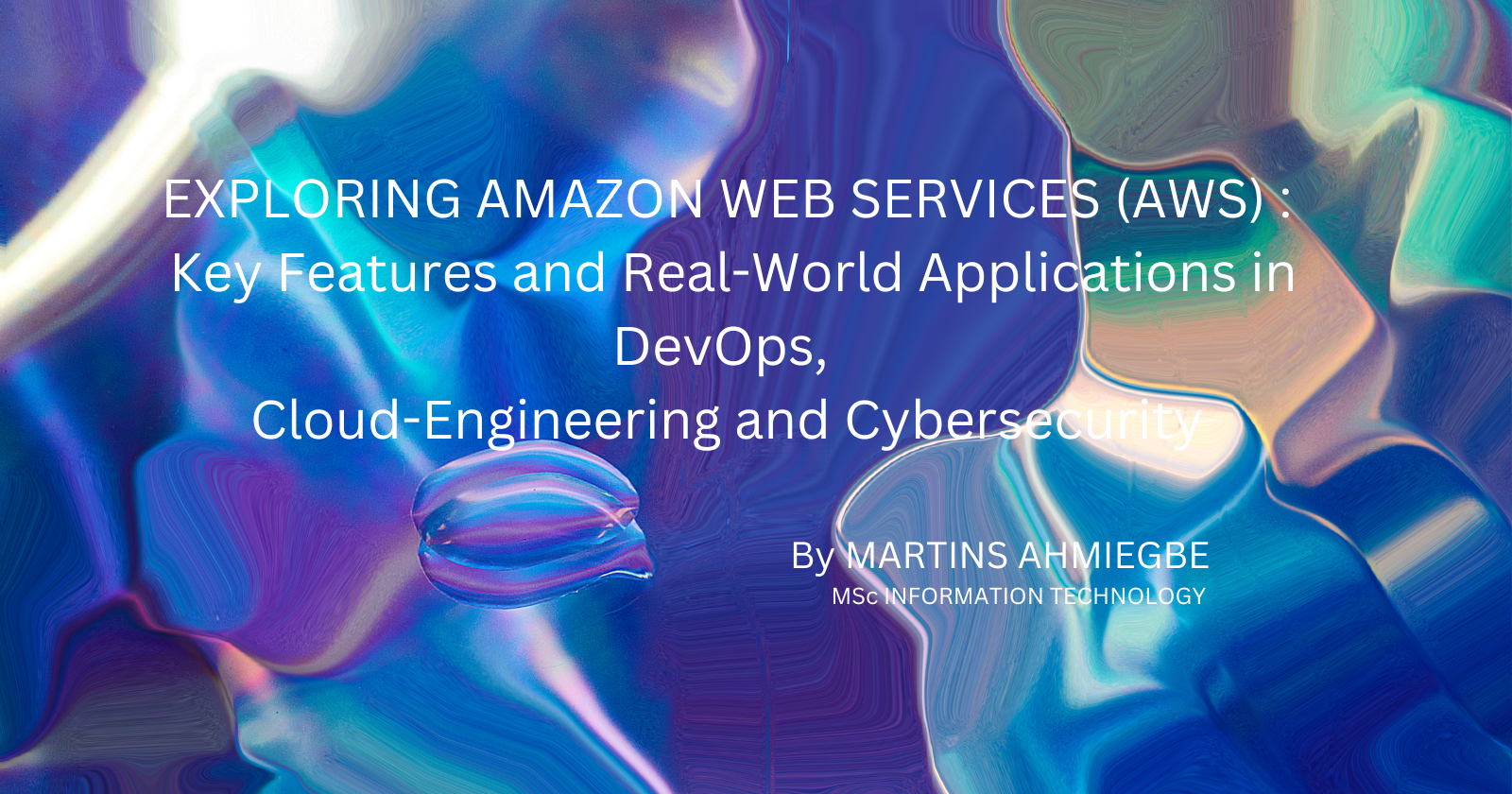
Amazon Web Services (AWS) is the global leader in cloud computing, offering a diverse range of services that empower businesses and developers to store, manage, and process data efficiently. With over 200 comprehensive services, AWS provides essential solutions such as computing power, storage options, machine learning capabilities, and database management. These services are available on a flexible pay-as-you-go model, catering to various business needs—from small startups to large enterprises.
Known for its scalability, flexibility, and cost-effectiveness, AWS is the preferred choice for organizations worldwide. Whether you need to run a simple website or develop sophisticated machine learning models, AWS offers the infrastructure and tools necessary for success. Amazon Web Services (AWS) is a leading cloud computing platform that offers a comprehensive suite of services tailored to meet the needs of various industries, particularly in DevOps, Cloud Engineering, and Cybersecurity. This overview delves into key features of AWS and highlights real-world applications that demonstrate its transformative potential.
Key AWS Services
1. Compute Services
AWS offers powerful tools to help developers run applications and manage workloads effectively:
Amazon EC2 (Elastic Compute Cloud): EC2 provides resizable virtual machines, allowing businesses to scale their computing capacity based on demand. Different instance types can be selected based on performance needs.
- AWS Lambda: A serverless computing service, AWS Lambda lets you execute code without the need for server management, making it ideal for event-driven processes.
2. Storage Services
AWS provides scalable and secure storage options suitable for various use cases:
Amazon S3 (Simple Storage Service): A highly reliable object storage service, S3 is designed to store and retrieve vast amounts of data. It's commonly used for backups, static website hosting, and data archiving.
Amazon EBS (Elastic Block Store): EBS delivers block-level storage volumes, ideal for high-performance applications like databases.
Amazon Glacier: A cost-effective service for long-term data archiving and backups.
3. Database Services
AWS offers a variety of database solutions to meet diverse business needs:
Amazon RDS (Relational Database Service): RDS simplifies database setup and management, supporting popular relational databases like MySQL, PostgreSQL, Oracle, and SQL Server.
Amazon DynamoDB: A fully managed NoSQL database, DynamoDB ensures fast, scalable, and reliable performance.
Amazon Redshift: A powerful data warehousing solution that supports complex queries on large datasets.
4. Networking Services
AWS networking services enable secure and efficient connections within the cloud:
Amazon VPC (Virtual Private Cloud): VPC lets you create isolated cloud networks, allowing full control over traffic between resources.
Amazon CloudFront: A content delivery network (CDN) that caches content at edge locations for low-latency delivery worldwide.
Elastic Load Balancing (ELB): ELB automatically distributes incoming traffic across multiple EC2 instances to ensure high availability and fault tolerance.
5. Security and Identity Services
AWS prioritizes security with advanced tools for protecting applications and data:
AWS IAM (Identity and Access Management): IAM helps manage and control access to AWS services by defining users, roles, and policies.
AWS Shield: A managed DDoS protection service that secures applications from attacks.
Amazon Inspector: A security assessment tool that analyzes applications to identify vulnerabilities.
6. Machine Learning and AI
AWS offers a variety of tools for building, training, and deploying machine learning models:
Amazon SageMaker: A complete machine learning platform for building, training, and deploying models at scale.
AWS Rekognition: An image and video analysis service for tasks like face detection and object recognition.
Amazon Polly: A text-to-speech service that converts written text into natural-sounding speech.
AWS Amazon Q: A generative AI-powered assistant for accelerating software development and leveraging companies internal data.
7. Developer Tools
AWS offers a set of tools that streamline software development and automation:
AWS CodeDeploy: A deployment service that automates the distribution of code across EC2 instances, AWS Lambda, or on-premises servers.
AWS CodePipeline: A continuous delivery service that automates build, test, and deployment phases.
AWS CloudFormation: A service that automates the provisioning and updating of AWS resources using templates.
8. Analytics and Big Data
AWS provides solutions for large-scale data processing and analysis:
Amazon Kinesis: A service for real-time data streaming and processing.
Amazon EMR (Elastic MapReduce): A managed Hadoop and Apache Spark service for big data analytics.
AWS Glue: A fully managed ETL service that prepares data for analytics.
Benefits of AWS
- Scalability: AWS's services are easily scalable, enabling businesses to adjust their resources as needed. Services like EC2 automatically scale to meet demand. AWS allows businesses to scale their infrastructure dynamically. Services like Amazon EC2 (Elastic Compute Cloud) enable users to adjust computing capacity based on demand, which is essential for applications experiencing variable workloads. For instance, Airbnb utilizes AWS to manage spikes in demand during peak travel seasons, ensuring a seamless booking experience for users
- Cost-Effectiveness: AWS's pay-as-you-go pricing model helps businesses manage costs without significant upfront investments in hardware or infrastructure.
- Global Infrastructure: AWS operates a vast network of data centers worldwide, ensuring low-latency access and high availability.
- Security: AWS offers robust security features such as encryption, DDoS protection, and Identity and Access Management (IAM), complying with global security standards like ISO 27001 and HIPAA.
- Reliability: AWS guarantees high availability and durability, with services like Amazon S3 providing 99.999999999% durability.
- Comprehensive Ecosystem: AWS provides a full spectrum of cloud services, from computing and storage to machine learning and analytics, enabling businesses to run virtually any application on the platform.
How to Get Started with AWS
Create an AWS Account: Sign up for an AWS account, providing payment details, and start using free-tier services at no cost.
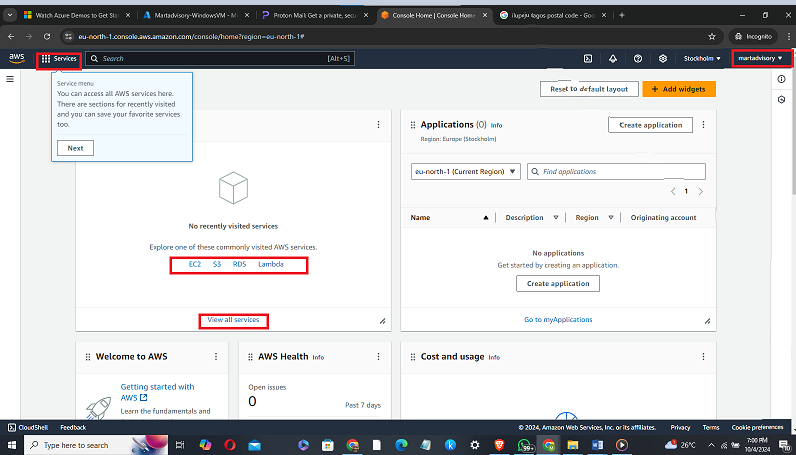
Access the AWS Management Console: Once your account is set up, log into the AWS Management Console to manage and configure your services.
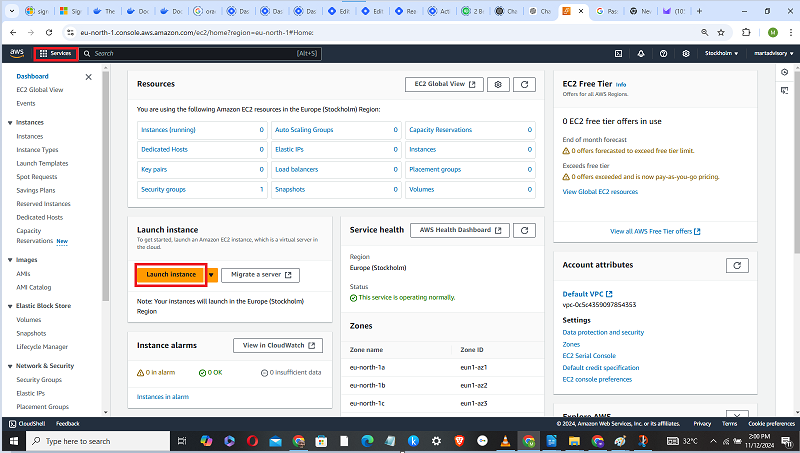
Launch an EC2 Instance: Use the EC2 dashboard to launch a new virtual machine, selecting from pre-configured AMIs or custom setups.
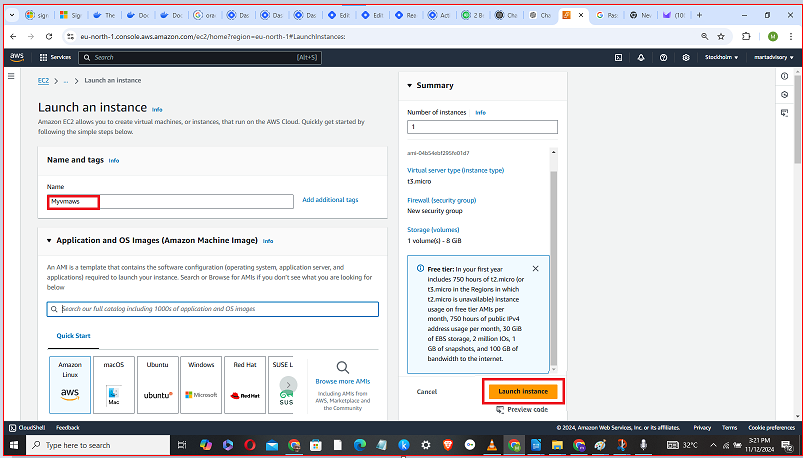
Set Up S3 Storage: Create an S3 bucket to store and manage your data
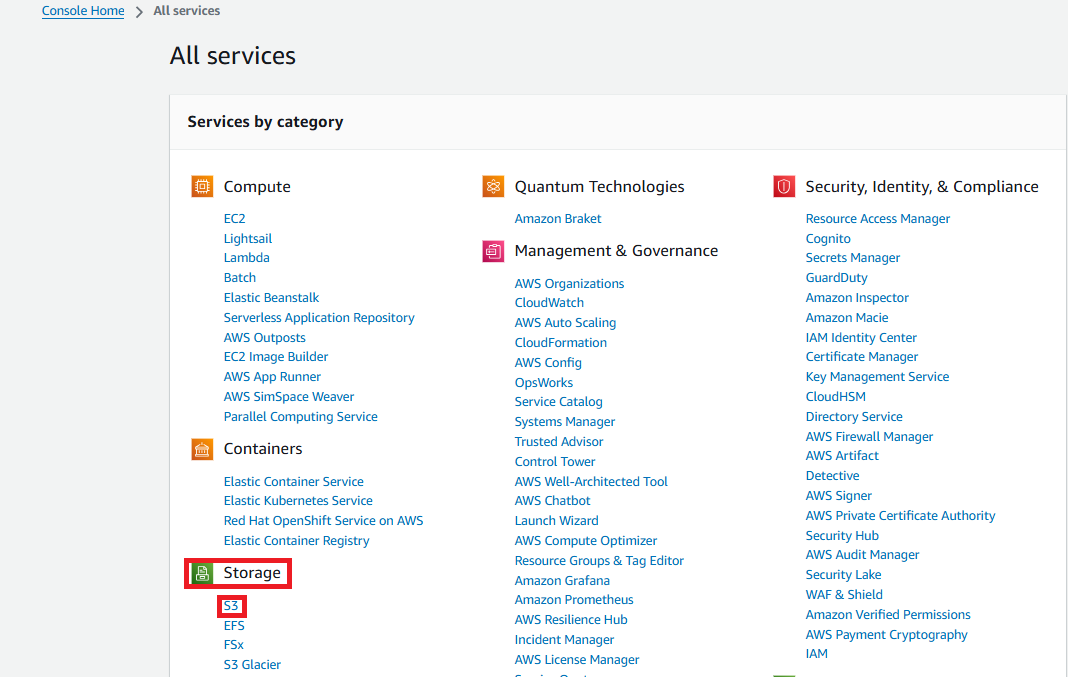


Use Cases of AWS
Website Hosting: AWS provides all the necessary tools to host websites, from static sites to complex web applications, using EC2, S3, and Route 53 (DNS service).
Data Backup and Archiving: AWS services like S3 and Glacier offer reliable and cost-effective storage for backups and long-term data retention.
Machine Learning and Data Analysis: Tools like SageMaker and Glue support the creation of machine learning models and data analysis at scale. AWS facilitates machine learning through services like Amazon SageMaker, enabling organizations to build, train, and deploy models at scale. For instance, AT&T Cybersecurity enhances its threat detection capabilities by utilizing AWS's machine learning tools, significantly improving the quality of alerts
DevOps Continuous Integration and Infrastructure as Code :
AWS’s CodePipeline, CodeDeploy, and CloudFormation automate software development and deployment workflows.
With tools like AWS CloudFormation, DevOps teams can automate infrastructure deployment, ensuring consistency across environments. This capability streamlines workflows and minimizes human error during deployments. Companies such as Netflix are planning to use AWS Lambda to create self-managing infrastructures that reduce inefficiencies in their operations
- Disaster Recovery:
AWS offers comprehensive disaster recovery solutions, allowing businesses to replicate workloads across regions and recover quickly during outages. AWS offers effective disaster recovery solutions through its global infrastructure, which includes multiple regions and availability zones. This design ensures high availability and durability of data, allowing businesses to implement robust disaster recovery as a service (DRaaS) strategies. For example, a leading financial institution leveraged AWS services such as S3 for data backup and RDS for database replication during crises, ensuring operational continuity
- Comprehensive Security Tools
AWS provides a robust security framework that includes:
AWS Identity and Access Management (IAM): Enables fine-grained access control to AWS resources.
AWS GuardDuty: A threat detection service that continuously monitors accounts and workloads for malicious activities.
AWS Web Application Firewall (WAF): Protects web applications from common exploits and DDoS attacks.
These tools are critical for organizations like FINRA, which analyzes 75 billion market events daily to detect fraud and insider trading using AWS Lambda for real-time processing
Real-World Applications
For DevOps Professionals
Continuous Integration/Continuous Deployment (CI/CD):AWS services like AWS CodePipeline enable automated testing and deployment of applications, facilitating faster release cycles.
Serverless Architectures: Utilizing services like AWS Lambda, developers can run code without provisioning servers, focusing on application logic rather than infrastructure management. For example, iRobot employs a serverless architecture to support its smart home devices with minimal operational overhead
For Cloud Engineers
Hybrid Cloud Solutions: AWS supports hybrid architectures that integrate on-premises data centers with cloud resources seamlessly. This is beneficial for enterprises transitioning gradually to the cloud while maintaining legacy systems.
Cost Management: The pay-as-you-go pricing model allows organizations to optimize cloud spending by only paying for what they use, making budget management easier during economic fluctuations.
For Cybersecurity Professionals
Real-Time Threat Detection: Tools like AWS GuardDuty provide continuous monitoring for threats across AWS environments, enabling rapid incident response.
Compliance and Data Protection: AWS adheres to numerous compliance standards (e.g., ISO 27001), crucial for industries handling sensitive data. The platform offers automated encryption services to protect data both at rest and in transit.
Conclusion
Amazon Web Services stands out as a robust platform offering essential features for DevOps professionals, cloud engineers, and cybersecurity experts. Its scalability, comprehensive security tools, disaster recovery capabilities, machine learning integration, and automation tools position AWS as a leader in cloud computing. By leveraging these capabilities, organizations can enhance resilience against cyber threats while streamlining development processes and optimizing resource management effectively. The success stories of companies like Netflix, Airbnb, and FINRA illustrate the transformative power of AWS across various industries.
References
1. Customer Case Studies https://aws.amazon.com/lambda/resources/customer-case-studies/
Real-World Examples of Disaster Recovery Using AWS https://intervision.com/blog-real-world-examples-of-disaster-recovery-using-aws/
What Is AWS
AWS Projects Ideas For Beginners https://www.projectpro.io/article/aws-projects-ideas-for-beginners/453
10 Examples of Scenario Based Learning Examples From AWS Training and Certification https://aws.amazon.com/blogs/training-and-certification/scenario-based-learning-examples-from-aws-training-and-certification/
Embracing The Cloud: 9 Things I Love AWS Real World Use Cases https://www.linkedin.com/pulse/embracing-cloud-9-things-i-love-aws-real-world-use-cases-mangla-biu5f
AWS Marketplace All Case Studies https://aws.amazon.com/marketplace/solutions/awsmp-all-case-studies
10 Fun Hands On Projects To Learn AWS https://www.pluralsight.com/resources/blog/cloud/10-fun-hands-on-projects-to-learn-aws
AT&T Cybersecurity Case Study https://aws.amazon.com/solutions/case-studies/att-cybersecurity-case-study/
AWS Security Tools https://www.sentinelone.com/cybersecurity-101/cloud-security/aws-security-tools/
Security https://aws.amazon.com/security/
Subscribe to my newsletter
Read articles from Martins Ahmiegbe directly inside your inbox. Subscribe to the newsletter, and don't miss out.
Written by

Martins Ahmiegbe
Martins Ahmiegbe
Digital Transformation Consultant | DevOps Enthusiast | Cloud Engineer | Public Speaker I am a Digital Transformation Consultant specializing in Enterprise Application Integration (EAI) and Business Process Automation (BPA), helping enterprises optimize operations and scale through cutting-edge technologies. My focus is currently on DevOps and cloud engineering with expertise in AWS, Azure, and Google Cloud. I design cloud architectures, implement CI/CD pipelines, and automate infrastructure provisioning, promoting agility and collaboration. I am passionate about Generative AI and emerging tech, having organized seminars on Digital Transformation, AI Tools, and The Metaverse. My recent seminar, “Unlocking Success: Seizing Business Opportunities in the Age of AI”, explored how businesses can harness generative AI to gain a competitive edge. Experience: Principal Consultant & CEO, Ahmiegbe Consulting Consultant/In-house Business Analyst, ln247 TV (2023 -2024) Lecturer, National Institute of Hospitality & Tourism (2018-2023) Network Administrator, Cross River University of Technology (2007-2010) Lecturer Computer Science Dept CRUTECH 2002-2007 Assistant Lecturer Computer Science Dept. Polytechnic Calabar 1998-2002 Core Skills: Knowledge Base of Computer Science and Information Technology. Cloud Engineering: AWS, Azure, Google Cloud DevOps: CI/CD, Automation, IaC Generative AI & Web Development Cybersecurity & System Testing Full Stack Web development. Public Speaking & Content Development Education: M.Sc. in IT, National Open University of Nigeria (2010) B.Sc. in Computer Science, University of Benin (1998) Publications: Tech Career Navigator (Amazon KDP 2024) Exploring the Metaverse (Amazon KDP 2023) How to Make Money Online ( Amazon KDP2023)